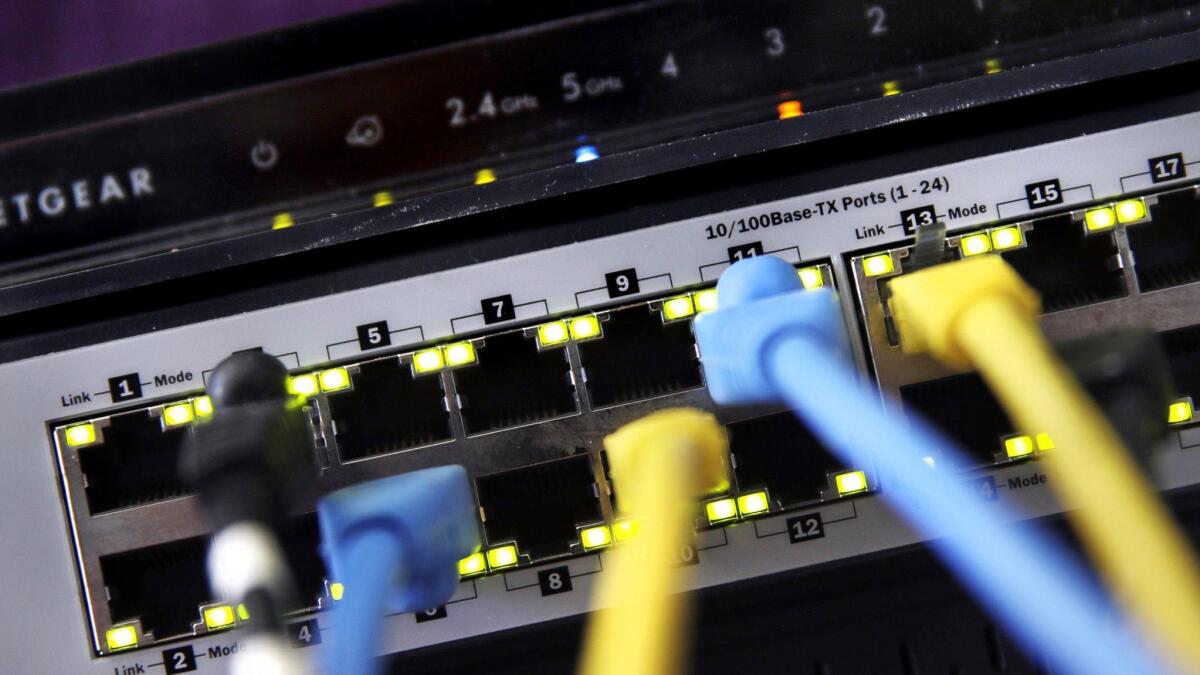The Democrats’ net neutrality bill is political virtue signaling at its worst

Congressional Democrats launched their latest effort Wednesday to preserve the free and open nature of the internet, unveiling bills in the House and Senate to reinstate the utility-style regulation the Federal Communications Commission adopted in 2015 before abandoning it two years later.
This is not a serious piece of legislation. Instead, it’s the political equivalent of virtue signaling — a display of support by Democrats for the strongest possible net neutrality rules. And it has no chance of becoming law.
Democrats should know that by now. Republicans may support the idea of net neutrality, but they won’t support neutrality rules that treat internet access services like the phone monopolies of yore. And that’s what the 2015 FCC rules did.
I get the legal argument for why the FCC, led by Democratic Chairman Tom Wheeler, went that route. Under the current version of the federal Communications Act, the FCC can’t bar internet service providers from doing such evil deeds as blocking or throttling legal websites and services unless it classifies broadband internet access as a “telecommunications service,” making it eligible for the strict rules once applied to phone monopolies.
And yes, I know that many communities have only one or two broadband ISPs today, and I get the argument that connecting to the internet is a lot like picking up the phone to make a call — the user decides where to go online, and all the ISP does is deliver the traffic, unaltered.
Enter the Fray: First takes on the news of the minute »
But here’s the thing. If Democrats are going to legislate, why settle for restoring the 2015 rules that Republicans oppose? Why not try to forge consensus on a whole new section of the Communications Act that authorizes and instructs the FCC to preserve net neutrality?
The FCC’s authority to regulate is the key sticking point here, and it has been for years.
Before the latest GOP-controlled FCC renounced the whole idea of net neutrality rules last year, the commission had been trying to safeguard the status quo online for well more than a decade, under both Republican and Democratic chairmen. But before 2015, every time they adopted rules or took action against ISPs that violated net neutrality, the courts rebuked them for overstepping their authority.
The 2015 rules sought to solve that problem by reclassifying ISPs as telecommunications services, giving the FCC all the authority it needed to enforce net neutrality rules. But the reclassification also gave the agency the authority to enforce rules dating back to the 1930s that had nothing to do with net neutrality — for example, the rules governing the prices ISPs charged for services.
It was a square-peg, round-hole approach, and it proved to be the rules’ political undoing. Major phone and cable companies asserted that this regulatory overhang would discourage investors and reduce spending on broadband networks, and Republicans sided with them. And once Republicans retook control of the FCC in 2017 under Chairman Ajit Pai, they not only repealed the 2015 rules, they declared that the FCC had no authority to regulate almost anything ISPs did.
The fight over net neutrality will continue to go back and forth like this until Congress writes new, internet-specific provisions into the Communications Act instead of relying on outdated rules written for previous generations of communications technology. Republicans might not be crazy about that idea, but there’s a solid free-market reason to regulate until there is vibrant competition among internet service providers throughout the country. As things stand, ISPs have the incentive and the opportunity to favor selected sites and services online for a fee.
Republicans have, in fact, put forward bills to write net neutrality rules into law — but without giving the FCC the power to adopt new rules should circumstances online demand them. There’s a middle ground here that authorizes the FCC to write and enforce a limited set of net neutrality rules, and it’s time for lawmakers to find it.
The X factor is the Court of Appeals for the District of Columbia Circuit, which is considering a lawsuit against the FCC’s decision to repeal the 2015 rules. If the lawsuit prevails, Republicans will be much more interested in a legislative fix — and Democrats will have no reason to support one. If the court upholds the FCC, the roles will be reversed. For that reason, the best time to seek a compromise may be now, while there’s still doubt about what the court will do.
Unfortunately, that’s not what Democrats are proposing. Maybe they’re counting on enough Republicans in the Senate to join them in supporting the 2015 rules, as three did last year. But that’s not enough to get a majority in the Senate this year, and it’s certainly not enough to override a certain veto by President Trump.
More to Read
A cure for the common opinion
Get thought-provoking perspectives with our weekly newsletter.
You may occasionally receive promotional content from the Los Angeles Times.







